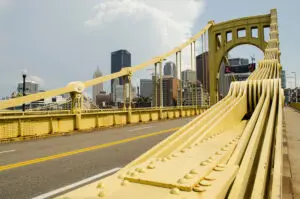If you’ve been injured in a trucking accident in Pittsburgh, attempting to gather evidence of the crash on your own will likely result in lost evidence, missed deadlines, and a severely weakened case. Trucking accident investigations require specialized knowledge of federal transportation laws, access to expert witnesses, and the legal authority to demand evidence preservation from trucking companies that would otherwise ignore your requests.
Experienced truck accident attorneys in Pittsburgh have the resources to immediately secure critical evidence that disappears within days of a crash. Without experienced legal representation, you’ll be fighting well-funded trucking companies and their insurance teams with lawyers working to minimize their liability the second after an accident happens.
Time is your enemy in trucking accident cases. Electronic data gets overwritten, witness memories fade, and trucking companies dispose of records according to federal timelines that favor their interests, not yours. Only an experienced Pittsburgh truck accident lawyer at Munley Law can act quickly enough to preserve the evidence you need for maximum compensation.
Why Pittsburgh’s Geography and Weather Make DIY Investigation Impossible
 You can’t investigate a Pittsburgh truck accident alone because the city’s unique conditions require specialized expertise that only experienced Pittsburgh truck accident lawyers possess. Here’s what you’d need to prove – and why you can’t do it yourself:
You can’t investigate a Pittsburgh truck accident alone because the city’s unique conditions require specialized expertise that only experienced Pittsburgh truck accident lawyers possess. Here’s what you’d need to prove – and why you can’t do it yourself:
- Pittsburgh’s Steep Hills Require Expert Analysis: When a truck crashes on Mount Washington or the South Hills, you must prove whether the braking system was adequate for that specific grade. This requires accessing manufacturer specifications, brake maintenance records, and engineering calculations that trucking companies won’t provide to accident victims. Only attorneys with legal authority can force companies to produce this evidence.
- Bridge Weight and Clearance Violations Need Legal Documentation: If a truck violated weight limits on the Fort Pitt Bridge or Liberty Bridge, you’d need official bridge engineering reports and the truck’s exact specifications. These technical documents aren’t publicly available, and you have no legal right to demand them from trucking companies or government agencies.
- Weather Conditions Require Professional Documentation: Pittsburgh’s sudden weather changes and river fog create dangerous conditions, but proving how weather contributed to your accident requires official meteorological reports, visibility measurements, and expert analysis. You can’t obtain certified weather data from Pittsburgh International Airport or force trucking companies to reveal whether their drivers were trained for local weather conditions.
- Highway Design Complexities Need Engineering Expertise: The convergence of I-76, I-79, and Route 28 creates traffic patterns that require accident reconstruction experts who understand Pittsburgh’s unique infrastructure. These experts cost thousands of dollars and don’t work with individuals—they only work with law firms that can guarantee payment and provide a proper legal framework for their testimony.
You Can’t Preserve Electronic Evidence Before Trucking Companies Destroy It
The most critical evidence in your truck accident case will disappear within days unless a lawyer acts immediately to preserve it. Here’s why you can’t protect this evidence yourself:
- Trucking Companies Ignore Requests from Accident Victims: The truck’s electronic control module (ECM) records speed, braking patterns, and engine performance data in the moments before your crash. This “black box” data gets automatically overwritten as the truck continues operating, sometimes within 72 hours. When you ask the trucking company to preserve this evidence, they’ll tell you to contact their insurance company, and the evidence disappears forever.
- Only Attorneys Can Send Spoliation Letters: Experienced truck accident lawyers immediately send spoliation letters that legally require trucking companies to preserve all evidence. These aren’t polite requests – they’re legal documents that create serious consequences if the company destroys evidence after receiving them. You can’t send a spoliation letter that carries legal weight because you don’t have the legal authority or knowledge to make it enforceable.
- Electronic Logging Devices Require Subpoena Power: Federal law requires trucks to use Electronic Logging Devices, better known as the “black box,” that record driving time and duty violations. However, trucking companies won’t voluntarily provide this data to accident victims. Only attorneys can subpoena these tamper-proof records that often reveal Hours of Service violations and regulatory breaches that prove negligence.
- Fleet Management Systems Are Protected Corporate Data: Many trucking companies use GPS tracking and driver behavior monitoring systems that could prove the driver was speeding, texting, or driving recklessly before your accident. This evidence is considered proprietary business information that companies will never share with individuals, but must produce when demanded through proper legal channels.
Federal Regulations Are Too Complex to Understand on Your Own
 Truck accident cases involve dozens of federal regulations you can’t understand or investigate without legal training. Here’s why you need professional help:
Truck accident cases involve dozens of federal regulations you can’t understand or investigate without legal training. Here’s why you need professional help:
- Hours of Service Violations Require Legal Expertise to Prove: Federal law limits how long truck drivers can operate before taking required rest periods, but proving violations requires analyzing complex logbook entries, cross-referencing electronic records, and understanding exceptions that vary by cargo type and route. Trucking companies employ teams of lawyers who specialize in defending these violations – you can’t match their expertise.
- DOT Safety Ratings Aren’t Publicly Accessible in Usable Form: The Department of Transportation assigns safety ratings to trucking companies based on violation patterns. However, accessing and interpreting this data requires knowledge of federal databases and regulatory codes. Without understanding how these ratings correlate to specific negligent practices, you can’t determine whether a company’s poor safety rating contributed to your accident.
- Medical Certification and Licensing Requirements Need Professional Analysis: Commercial drivers must meet strict medical standards and maintain proper licensing, but verifying compliance requires accessing restricted DOT databases and understanding complex medical qualification requirements. Trucking companies won’t provide this information to accident victims, and you have no legal authority to demand it.
- Drug and Alcohol Testing Records Are Protected Information: Federal law requires trucking companies to conduct regular drug and alcohol testing. However, these records are confidential, and companies will never voluntarily share. Only attorneys with proper legal authority can obtain testing records that might show the driver had a history of substance abuse or failed recent tests.
You Can’t Identify All the Responsible Parties Without Legal Resources
Trucking companies deliberately create complex corporate structures to hide their assets and limit liability. Here’s why you can’t navigate these arrangements alone:
- Corporate Shell Games Require Forensic Investigation: What looks like a simple case against a truck driver often involves multiple LLCs, leasing companies, and parent corporations spread across different states. These companies hire lawyers to create confusing ownership structures that make it nearly impossible for accident victims to identify who has insurance coverage and assets to pay damages.
- Pittsburgh’s Industrial Cargo Creates Hidden Liability: Pittsburgh’s steel, chemical, and construction material haulers operate under specialized regulations that create additional liability for cargo loading companies, maintenance contractors, and equipment manufacturers. You can’t identify these parties without understanding industry-specific regulations and having access to shipping manifests and maintenance records that companies won’t provide to individuals.
- Insurance Policies Are Deliberately Complex: Commercial trucking insurance involves multiple layers of coverage, excess policies, and exclusions that require legal expertise. Trucking companies won’t explain their insurance arrangements to accident victims, and you can’t force disclosure of policy limits and coverage details without legal authority.
- Government Liability Requires Specialized Knowledge: Sometimes, Pittsburgh’s road design, construction zones, or poor maintenance contribute to truck accidents, creating potential claims against government entities. These cases involve strict notice requirements, sovereign immunity issues, and procedural deadlines you’ll miss without legal guidance, destroying your right to compensation from these deep-pocket defendants.
- Vehicle Inspection and Maintenance Records Analysis: Federal regulations require trucking companies to have their commercial truck drivers conduct thorough daily inspections of their vehicles and document any defects or problems found during these inspections. These Daily Vehicle Inspection Reports provide crucial evidence about the truck’s condition and any problems that might have contributed to the accident.
Given Pittsburgh’s demanding driving conditions, maintenance becomes even more critical. Investigators examine maintenance schedules, brake system service records, and parts replacement documentation to determine whether mechanical failures played a role in causing the crash. Pittsburgh’s steep terrain requires more frequent brake maintenance and inspection, and failure to account for these conditions can constitute negligence.
How Experienced Pittsburgh Truck Accident Attorneys Investigate Your Case
When you’re dealing with the aftermath of a serious trucking accident in Pittsburgh, you need a team of truck accident lawyers who understand the intricate federal investigation process and the unique challenges of Pittsburgh’s roads and terrain. The right legal team brings experience in trucking accident investigations specific to Pennsylvania law and Pittsburgh’s distinctive geographic challenges.
A skilled investigation team will get to work immediately after your truck accident, working to preserve crucial evidence before it disappears forever. They send spoliation letters within hours, coordinate with accident reconstruction experts familiar with Pittsburgh’s road conditions, and ensure that every aspect of your case is thoroughly investigated. While you focus on your recovery, experienced attorneys handle the complex technical and legal aspects of building your case.
Most importantly, quality investigation services typically come at no upfront cost. Reputable firms advance all investigation expenses and only recover fees when they successfully resolve your case. Don’t let crucial evidence disappear while you’re recovering from your injuries.
If you’ve been injured in a trucking accident in Pittsburgh, contact an experienced truck accident attorney at Munley Law immediately for a free consultation to discuss how a skilled investigation team can begin building your strongest possible case. There is no fee unless we win your case.
Munley Law Personal Injury Attorneys
510 Third Avenue
2nd Floor,
Pittsburgh, PA 15219
(412) 534-5133









